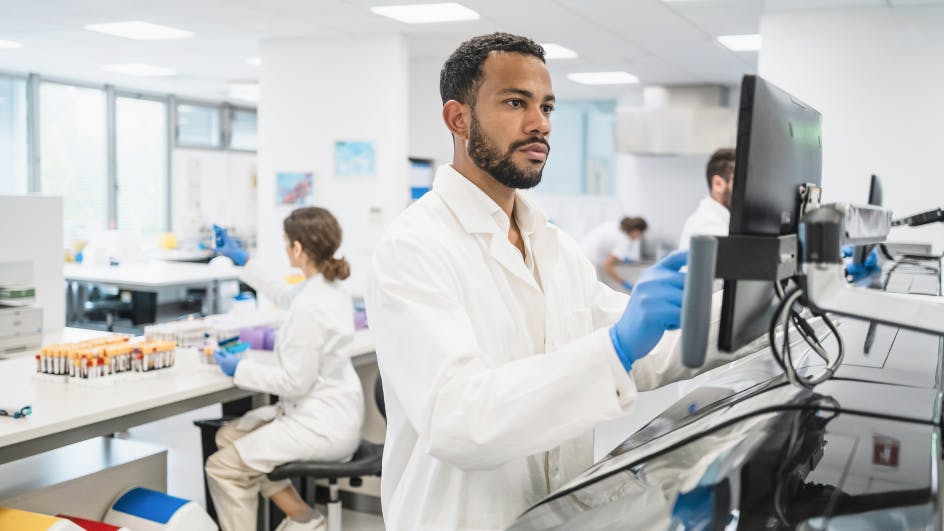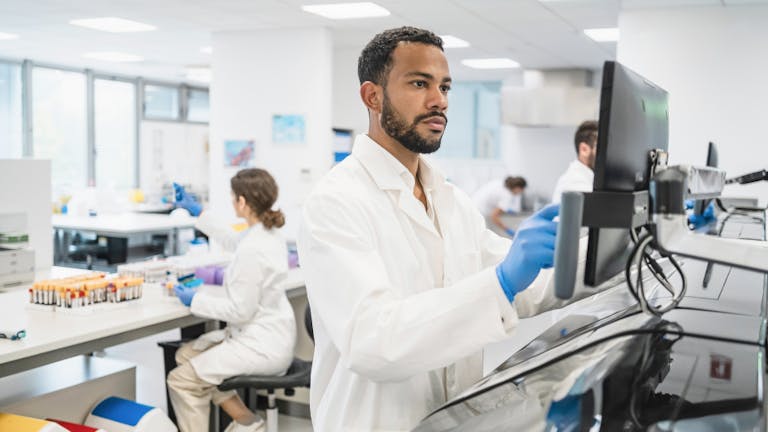Diagnostics is the backbone of modern healthcare, with 70% of today's medical decisions relying on lab test results.
But the workforce that powers this crucial function is under strain, largely due to a lack of career mobility for frontline roles.
When employees don’t see a clear path for career advancement, talent pipelines dry up. Combined with turnover, burnout, and persistent talent shortages, the result is a looming talent crisis that undermines the reliability of diagnostic testing.
HR and L&D leaders are in a unique position to redefine what career growth looks like in diagnostics. By building intentional mobility programs, you can transform frontline roles into launchpads for long-term careers, strengthening both your workforce and business.
Why lab roles stall out
Despite being on the frontline of life-saving medical work, lab workers are often overlooked when it comes to growth and development opportunities. When these opportunities do exist, they tend to lead towards non-testing work.
Clinical labs often don’t have well-defined career ladders for their entry-level employees. There's also the issue of limited access to affordable education for advanced certifications and degrees that allow employees to move up the career ladder.
Beyond the lack of growth opportunities, turnover and heavy workloads are two additional factors that create major operational challenges that stall career advancement.
The business benefit of mobility
Career advancement is more than an employee perk, it’s a strategic benefit for the business. Building strong internal pipelines eases staffing shortages by preparing existing employees to step into higher-skill roles as vacancies arise. This reduces the time and cost of external recruiting, while ensuring labs have qualified staff ready to maintain the accuracy and timeliness of results.
At the same time, growth opportunities foster deeper engagement and loyalty across the workforce.
How to make mobility a reality in diagnostics
So, what would it take to implement career mobility that helps entry-level lab workers move into advanced lab positions?
Make education accessible and relevant
The first step is to make education accessible. That starts with removing barriers like the upfront costs of traditional tuition reimbursement programs, which many employees might not be able to afford. By covering tuition directly, organizations lift a major financial burden and open the door to broader participation.
Partnering with the right learning providers ensures programs are designed to fit employees’ schedules through options like online learning, self-paced modules, and short courses. Just as important, the programs you offer should build skills that are relevant to their current roles and future opportunities within the organization.
Develop career paths that are supported by upskilling opportunities
Next, it’s important to give employees a clear view of what advancement can actually look like. A well-defined career path helps them visualize how they can grow, whether that means moving from Lab Tech to Technologist, Supervisor, or operations leadership.
The most effective career paths go beyond showing job titles in sequence. They outline the learning and upskilling required to build skills for each step, and they make the criteria for progression transparent so employees know exactly what it takes to move forward.
Broaden skills through cross-training
Give lab staff rotations in areas like quality, data, or clinical operations to broaden their skills. Cross-training not only builds flexibility, it creates a reserve of staff who can step in during absences or surges, reducing overtime and keeping workflows steady.
It also strengthens culture by boosting collaboration and showing employees how different functions connect.
Develop durable skills alongside technical ones
Preparing frontline workers for advancement means developing more than just technical expertise. Durable skills like leadership, communication, and project management are critical across every role, and when employees build them, they’re better equipped to step into supervisory and cross-functional positions.
Reinforce growth with mentorship and success stories
To motivate employees to move up in their careers, it's important to show them what’s possible. Share stories of colleagues who have advanced within your organization to make career mobility feel tangible. Pair employees with mentors who have made the same journey from the lab to new roles, giving them both guidance and proof that advancement can be a reality.
The reliability of diagnostics is at stake
Critical medical decisions rely on the diagnostics industry. To safeguard this work, the diagnostics workforce must be given the opportunity to advance in their roles so that talent pipelines don’t dry up.
Ready to see how the right talent strategy can serve your workforce over the long run? This playbook, designed for diagnostics leaders, offers a 3-part approach to solving your most urgent talent challenges.

